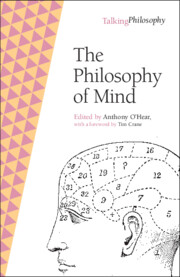Book contents
- The Philosophy of Mind
- Talking Philosophy
- The Philosophy of Mind
- Copyright page
- Contents
- Foreword
- List of Contributors
- Introduction
- The Mind–Body Problem after Fifty Years
- How to Find the Neural Correlate of Consciousness
- Embodiment and the Philosophy of Mind
- Folk Psychology and Mental Simulation
- Understanding Other Minds from the Inside
- Self-knowledge: the Wittgensteinian Legacy
- Joint Attention and the First Person
- Consciousness as Existence
- Setting Things before the Mind
- Perceptual Intentionality, Attention and Consciousness
- Experience and Reason in Perception
- Intentionality as the Mark of the Mental
- Intentionality and Interpretation
- Externalism and Norms
- Mind, World and Value
- Mind, Knowledge and Reality: Themes from Kant
- The Modality of Freedom
- Dualism in Action
- Index
Self-knowledge: the Wittgensteinian Legacy
Published online by Cambridge University Press: 19 May 2022
- The Philosophy of Mind
- Talking Philosophy
- The Philosophy of Mind
- Copyright page
- Contents
- Foreword
- List of Contributors
- Introduction
- The Mind–Body Problem after Fifty Years
- How to Find the Neural Correlate of Consciousness
- Embodiment and the Philosophy of Mind
- Folk Psychology and Mental Simulation
- Understanding Other Minds from the Inside
- Self-knowledge: the Wittgensteinian Legacy
- Joint Attention and the First Person
- Consciousness as Existence
- Setting Things before the Mind
- Perceptual Intentionality, Attention and Consciousness
- Experience and Reason in Perception
- Intentionality as the Mark of the Mental
- Intentionality and Interpretation
- Externalism and Norms
- Mind, World and Value
- Mind, Knowledge and Reality: Themes from Kant
- The Modality of Freedom
- Dualism in Action
- Index
Summary
It is only in fairly recent philosophy that psychological self-knowledge has come to be seen as problematical; once upon a time the hardest philosophical difficulties all seemed to attend our knowledge of others. But as philosophers have canvassed various models of the mental that would make knowledge of other minds less intractable, so it has become unobvious how to accommodate what once seemed evident and straightforward – the wide and seemingly immediate cognitive dominion of minds over themselves.
- Type
- Chapter
- Information
- The Philosophy of Mind , pp. 156 - 191Publisher: Cambridge University PressPrint publication year: 2022

